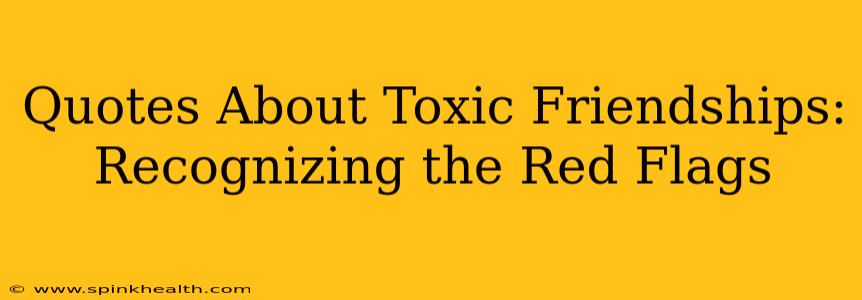Navigating the complexities of friendships can be challenging. While supportive friends enrich our lives, toxic friendships can drain our energy and negatively impact our well-being. Identifying these relationships is crucial for protecting your mental and emotional health. This article explores insightful quotes about toxic friendships, highlighting the red flags to watch out for and offering strategies for navigating these difficult dynamics. We'll delve into the subtle and overt signs, helping you recognize when a friendship has become detrimental and what steps you can take to address the situation.
What are the signs of a toxic friendship?
This is a frequently asked question, and the answer isn't always straightforward. Toxic friendships manifest differently depending on the individuals involved, but several common red flags emerge. These warning signs often involve a consistent pattern of behavior rather than isolated incidents.
"A true friend is someone who is there for you, not someone who uses you for their own gain."
This quote perfectly encapsulates a core aspect of toxic friendships: one-sidedness. A toxic friend might consistently take more than they give, emotionally leeching off your energy and support without reciprocating. They may be self-centered, prioritizing their needs above yours, leaving you feeling depleted and undervalued. Look for instances where you’re constantly giving emotional support, time, or resources, while receiving little to nothing in return.
"Friends don't tear you down; they lift you up."
Another critical sign of toxicity is consistent negativity and criticism. A toxic friend might frequently belittle your achievements, make you feel insecure, or sabotage your efforts. Instead of celebrating your successes, they may downplay them or even try to undermine your progress. This type of behavior is emotionally damaging and can significantly impact your self-esteem.
"A real friend won't make you question your own sanity."
Gaslighting is a particularly insidious form of manipulation often found in toxic friendships. This involves making you doubt your own perceptions and memories, subtly twisting situations to make you feel like you're the one at fault. If a friend consistently makes you feel confused, uncertain, or question your own judgment, it's a serious red flag.
How do I know if a friendship is truly toxic?
The line between a challenging friendship and a toxic one can be blurry. A truly toxic friendship consistently leaves you feeling drained, anxious, and unhappy. You might find yourself constantly walking on eggshells, anticipating their reactions, or feeling a sense of dread when interacting with them. This persistent negativity significantly impacts your overall well-being, affecting your mood, sleep, and even physical health.
What are some common characteristics of toxic friendships?
Several characteristics often define toxic friendships. These include:
- Control and manipulation: A toxic friend may attempt to control your actions, decisions, or relationships.
- Jealousy and competition: They might be envious of your successes or constantly compete with you.
- Gossip and betrayal: They may spread rumors about you or betray your trust.
- Lack of respect for boundaries: They consistently disregard your personal boundaries, ignoring your requests or needs.
- One-sided support: The friendship feels unbalanced, with you consistently providing support while receiving little in return.
Moving Forward: Strategies for Dealing with Toxic Friendships
Recognizing a toxic friendship is the first step towards reclaiming your well-being. It’s important to remember that you deserve healthy, supportive relationships. While ending a friendship can be difficult, it's often necessary for your mental and emotional health. Consider setting boundaries, limiting contact, or even ending the friendship entirely. Remember that prioritizing your well-being is crucial. Surrounding yourself with supportive and positive individuals is essential for a happy and fulfilling life.
This process of recognizing and addressing toxic friendships is a journey that requires self-reflection and courage. Remember to prioritize your mental health and wellbeing above all else.

